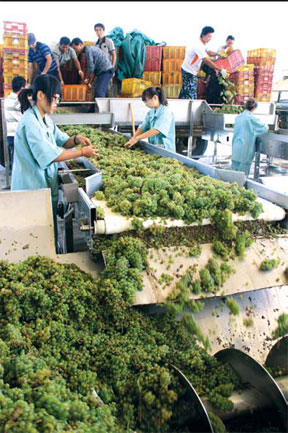Changyu: New harvest, wine and chateau in Xinjiang
Updated: 2011-11-02 08:01
By Ju Chuanjiang and Zhao Ruixue (China Daily)
|
|||||||||||
|
An artist's rendering of Chateau Changyu Baron Balboa scheduled to be completed next year. Photos by Ju Chuanjiang / China Daily |
With a good harvest at Changyu's vineyards in the Xinjiang Uygur autonomous region this year, wine enthusiasts will have the chance to enjoy a vintage that tastes different from the noted winemaker's other products.
The wine from Xinjiang will have a stronger fragrance, according to Cheng Guoli, chief agronomist at Changyu Pioneer Wine Co.
"Grapes from our vineyards in various regions have different flavors, so they're used for different types of wines," Cheng said.
Changyu now has a combined 16,666 hectares of vineyards in Xinjiang, Ningxia, Shandong, Shaanxi, Liaoning and Beijing - fully a quarter of the entire grape growing area in China.
After three years of planting and nurturing quality grape vines, Changyu now has a combined 4,666 hectares of vineyards in the north of Xinjiang.
With dry weather, favorable soil conditions and 2,700 hours of annual sunshine, the area is regarded as one of the best places in the world for quality grapes. The vineyard is irrigated by water from the snow-covered Tianshan Mountains 200 km away.
The sunshine and huge day-night temperature differential result in grapes with more sugar content, according to Wang Jianguo, manager of the Xinjiang vineyards.
"Last year, the average sugar content in grapes from Xinjiang reached 23.65 percent, a figure is seldom seen even in Bordeaux, France's prominent wine producing region," Wang said.
The Eighth Division of the Xinjiang Production and Construction Corp (XPCC) is responsible for growing grapes for Changyu in the autonomous region.
To better use the natural conditions for quality grapes, Changyu and the Eighth Division have begun growing organic grapes. This year, they had a try on 26 hectares.
The grapes will be exclusively used for high-end wine, according to Cheng.
Farmers benefit
Workers sort Xinjiang grapes used in winemaking.

Although Xinjiang is blessed with favorable natural conditions, farmers didn't benefit much from growing grapes in the past.
"Although grape output increased in 2005, the earnings just balanced my expenses because no big enterprises offered a proper price," said Zhang Chengli, a farmer in the 152nd Regiment of the Eighth Division.
Things changed when Changyu and the XPCC began to cooperate on growing grapes three years ago.
The corp's Eighth Division has a team to manage the vineyards, while Changyu gives guidance to growers to insure grape quality, then buys the grapes at proper prices.
"Farmers are expected to have doubled the income they receive from growing cotton - this year, each family will have an income of 40,000 yuan on average," said Tan Jianxin, deputy chief of the Eighth Division.
"The grape growing area at our division is expected to reach 5,330 hectares next year," said Tan.
Changyu is also using new technologies at its Xinjiang vineyards including gravity-fed irrigation with water from the Tianshan Mountains, resulting in a cut in cost of 3,000 yuan per hectare and considerable reductions in use of local water.
Competitiveness
The Chinese wine market has grown 16.7 percent annually in recent years, according to China Vine and Wine Association, as living standards and disposable income continue to improve.
Yet consumption is still much lower than the world per capita average of six liters.
Seeing the potential, wine producers from Europe and the Americas are coming to China in greater numbers.
Faced with increasing imports, Changyu has been working to convince consumers its wines can rival the world's best.
It has also built iconic chateaus at its vineyards, with another in Xinjiang - Chateau Changyu Baron Balboa - now under construction.
This chateau in Shihezi is expected to be operational next year.
With French-style gardens, Xinjiang's grape growing culture and Changyu's century-old winemaking history, the chateau is set to be the most prestigious in West China.
The company already operates Chateau Changyu-Castel in Yantai, Chateau Changyu AFIP Global in Beijing and an ice wine chateau in Liaoning.
Chateaus in Shaanxi and Ningxia are also under construction.
"The wines produced at the chateaus are the main part of Changyu's high-end products," said Cheng Guoli.
The company has also forged partnerships with four overseas chateaus.
Changyu's high-end wines have been served at Beijing's Great Hall of the People and Diaoyutai State Guesthouse.
And more people in China are expected to have access to Changyu wines as its output will double to reach 400,000 tons by 2015, said Zhou Hongjiang, the winemaker's general manager.
(China Daily 11/02/2011 page24)
